Join us this Lent for “Holy Week with Jesus and his Disciples in the Cenacle” (Ash Weds – Mar 5)
By Robert Fontana
The word “Cenacle” refers to the “Upper Room” where Jesus gave his disciples the Eucharist, washed their feet, and taught them of the Father’s love and the gift of the Holy Spirit. It is also the place where Jesus regathered the disciples following his resurrection to “breathe” on them the Holy Spirit and send them out as missionaries.
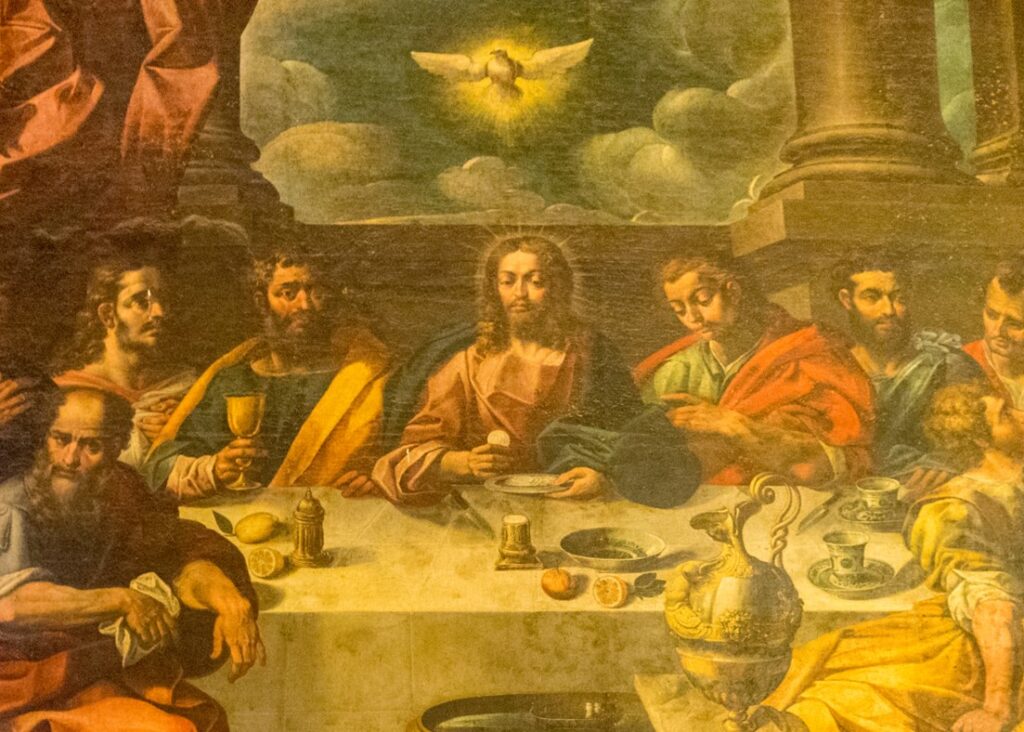
During Lent, we will be hosting a weekly small group Scripture study and faith-sharing series called Holy Week with Jesus and His Disciples in the Cenacle. It will be held at Assumption Parish. This Lenten series begins on Wednesday, March 12 (7:00 – 8:30 pm) for in-person sessions (also offered via Zoom); and will be repeated on Thursday mornings via Zoom only, beginning March 13, 9:00 – 10:30 am.
To register, or if you have any questions, write Robert and/or Lori at roblori.fontana@gmail.com. Once you have registered I will send you a pdf of the booklet that we will be using so you can print it out yourself. If you are not able to print out your copy, let us know and we will mail you one.
Here’s the introduction to the booklet.
Introduction: The Gospel of John, more than the other Gospels, tells the unique experience of the disciples of Jesus during the days before and after his death, while they were gathered in what is called in Greek the “Cenacle,” meaning the upper room. The “Cenacle” refers not only to the upper room; it refers to the community of disciples who were privileged to be with Jesus during this time.
While in the upper room, Jesus sealed his relationship with his followers, the Cenacle, by:
1) giving them the Eucharist;
2) leaving them an example of service by washing their feet;
3) revealing to them the Father’s love and the gift of the Spirit;
4) leading them to the cross;
5) and, after his death, regathering them in the Cenacle, the upper room, to mission them by breathing on them his Spirit.
These intense moments with Jesus gave the first Cenacle the core dimensions of faithful discipleship that are essential for Christians in all generations.
Fr. Thomas Judge, a Vincentian priest (1868-1933), recognized this early in the 20th Century when he began the modern Cenacle movement in the United States. It became clear to him that if the Church was going to make a difference in the lives of people, especially the immigrant poor, who were at that time coming to the United States in great numbers from Italy and Eastern Europe, it was essential for Catholics to become the Cenacle of the New Testament. He desired that every Catholic become an apostle, and he knew that would only happen if Catholics participated wholeheartedly in a Cenacle, in which the Eucharist, service, love of the Trinity, solidarity with the cross, and empowerment by the Holy Spirit were lived realities.
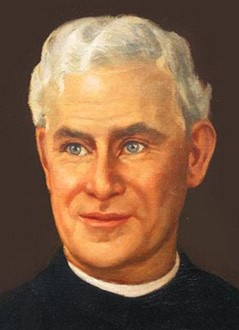
Father Judge formed Cenacles in different parishes in which he preached retreats. He taught these Cenacle missionaries to be a power for good within the providence – relationships and commitments – of their everyday lives. By instructing Cenacle associates in the lived experience of the New Testament Cenacle, Fr. Judge inspired these lay apostles to “be the Church” in their homes, neighborhoods, and workplaces. They would then come together as a Cenacle to respond to the local needs of the parish and /or civic community, especially by serving the poor.
The Cenacle Family was begun by Fr. Judge, who then recruited the assistance of Mother Boniface Keasey and Dr. Margaret Healy. This movement eventually developed into four different communities: the lay branch – the Missionary Cenacle Apostolate (MCA); the women religious – the Missionary Servants of the Most Blessed Trinity; the men religious – the Missionary Servants of the Most Holy Trinity; and laity under private vows – the Blessed Trinity Missionary Institute.
Yet each of these branches shares the same charism and mission: to help every Catholic (and Christian from any faith tradition) to become an apostle.
Lori and I were introduced to the Cenacle through the Cenacle priests serving at the campus ministry we attended while in college. Fr. Dennis Berry, ST, recognized in us the same sort of apostolic spirit that Fr. Judge sought to instill in the laity and invited us to enter the Missionary Cenacle Apostolate (MCA). We made our act of consecration in the mid 1990’s and have lived out our Catholic life as Cenacle missionaries ever since. We have been joined by friends and supporters of CLM. Together we form the Magnificat Cenacle in Seattle.
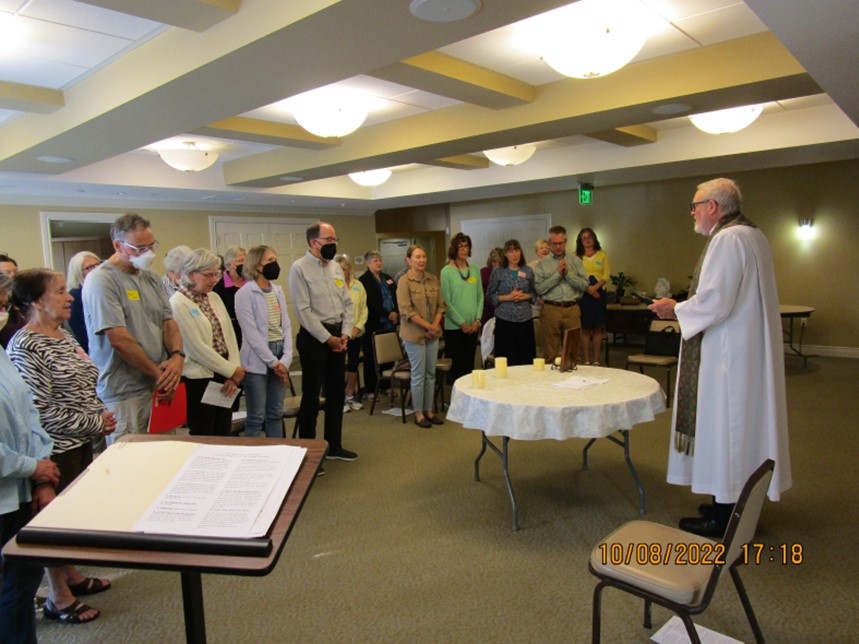
The purpose of this faith-sharing booklet is to help you reflect on the intimate and transformative experience that the original Cenacle had with Jesus during the days before and after His death. We pray that, in your own study, reflection, and prayer, you will experience similar intimacy and transformation in your life as you deepen your vocation as an apostle, also helping others to become apostles of the Father, Son, and Spirit.
Send me an email at robert@catholiclifeministries if you would like to participate.
Grieving Orca Mom, Pro-life, and the Culture War
By Robert Fontana

I often hear from my liberal friends who are Christian how confounding it is for them that conservative Christians, including Catholics (my faith tradition), support Donald Trump, whom the Christian Left considers the most un-Christian president in US history. The Christian Left does not seem to understand that they helped create the MAGA Right in which many conservative Christians find a home (and, of course, Christians on the Right do not understand that they helped create the Progressive Left).
This was vividly illustrated for me recently in a Seattle Times opinion article entitled, “How we can honor the orca Tahlequah’s grief.” The article highlights the plight of the orcas whose food source, the chinook salmon, is in decline and whose way of life in the Salish Sea (Puget Sound) is continually challenged by commercial shipping and the ever-present whale-watching tourist boats. I share the author’s concern about the stress orcas are enduring and the sad plight of this mother orca who, for the second time in the past few years, has carried her dead calf weeks after the calf’s death.
However, what struck me about the headline is the vivid reminder to Christians on the Right that their brothers and sisters on the Left care more about the plight of orcas than about the unborn. One will never see in the Seattle Times a headline grieving the loss of the unborn child through abortion. The Left insists that a woman’s right to her body is absolute. “My body, my choice.” End of discussion!
The Christian Right is equally unwilling to dialogue. “We have science on our side; human life begins at conception:” this is not simply a religious conviction, it is a scientific fact. The fetus in the womb is a baby with the inalienable right to life. Oh, and, yes, it’s your body, but you don’t have an absolute right over how you treat your body. If you are pregnant, there is a baby whose rights outweigh yours. End of discussion.

Other issues push each side further into its corner with no option for compromise, for example, racism, transgenderism, and immigration. The immovable stances fuel a culture war in a zero-sum game which creates only winners and losers. Democracy demands uncomfortable compromises so that we do not actually end up with another shooting war like the one in 1861.
Long before I joined “Braver Angels,” an organization dedicated to dialogue between the Left and the Right, I had an extended conversation with a liberal friend that convinced me that dialogue, listening for understanding, and compromise were the only paths forward to end the culture war in our church and country on abortion. Here’s what happened:
Me: Pro-choice and pro-abortion. They’re the same.
Friend: NO!! I’m pro-choice, but I’m not pro-abortion.

Me: C’mon. You constantly use the phrase “fetus” when talking about an unborn baby. You know the science of conception as well as I do. The fetus in the womb is a baby from the moment of conception. Pro-choice means abortion on demand and the death of a baby.
Friend: If you would listen to me, I’ll explain. Yes, I agree with the science, and I also admit that I refer to the baby in the womb as a fetus and not a baby. I want to honor the dignity of the woman who has a crisis pregnancy. You seem to care little about her. (Pause)
Friend: I abhor abortion. To be pro-choice means to offer her (and her husband/partner if she has one) two options for saving the baby’s life, raising the child herself or giving the child up for adoption. The third option is tragic, but it is not the government’s call to prevent should a woman with a crisis pregnancy choose it. She knows her situation.
[My friend went into detail about a young white woman from a very conservative family who was secretly dating a young black man. When her father found out about this relationship, he hit his daughter and threatened to kill the young man if she didn’t break it off. Shortly after this she learned that she was pregnant; immediately she had an abortion.] I don’t want a woman in her situation to have a back-alley abortion.
Me: No, I don’t want women to have a back-alley abortion either…I don’t think I have given enough consideration to the woman with a crisis pregnancy. So, there are two lives that must be considered, protected. Would you agree to that?
Friend: Yes, that’s why I say I am not pro-abortion. Abortion is a tragic choice especially as the fetus, the “baby” develops. Pro-choice means, in the end, the choice does rest with the mother. I will do whatever I can to help her choose life for the baby, but I will not throw a guilt trip on her either.
Me: Where do we have unity?
Friend: I suppose we can both agree that two lives must be valued and protected if possible.
Me: And I have a better understanding that pro-choice is not pro-abortion. And I also agree that the mother’s situation really needs to be honored and respected, though I do not agree with the idea that the government can not regulate abortion. (Our conversation ended peacefully there.)
We did not solve the abortion debate with this conversation. But we did stop seeing each other as adversaries on this issue. We learned from one another, which allowed each of us to soften our positions. We both changed. Our next conversation might find some common ground on the legal boundaries of abortion that either of us may not like but could live with for the sake of peaceful coexistence.
I think dialogue and a search for common ground is the only path forward for ending the culture war between the Left and the Right. What do you think?
(Please post your thoughts and comments.)
Consider Joining Braver Angels. Its mission is to bring Americans together to bridge the partisan divide and strengthen our democratic republic. Go to: braverangels.org

YEAH, A Week to Celebrate Marriage (Feb 7-14)
By Robert Fontana
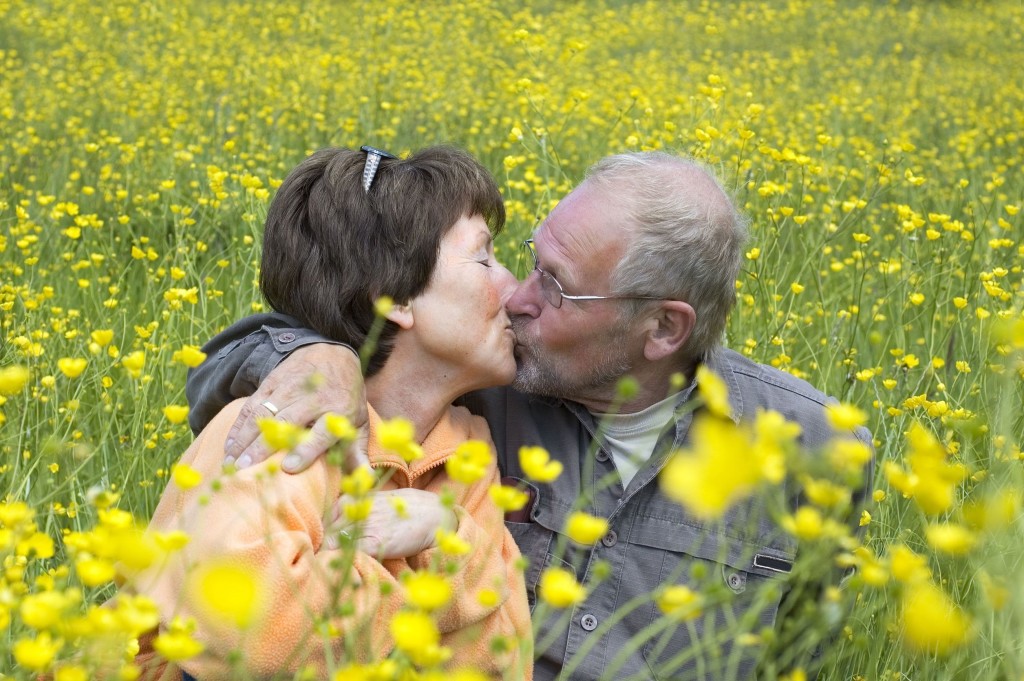
NATIONAL MARRIAGE WEEK is February 7-14! I find it a little discombobulating to write about something so positive while the country dissolves into chaos over Trump’s dismantling of democracy. Still, it is NATIONAL MARRIAGE WEEK, and I’ll keep my focus on this important civic and religious institution. I’m a believer in the institution of marriage and will do whatever I can to help couples of all stripes – religious, secular, straight, gay – to succeed in marriage.
THERE ARE NO LOSERS WHEN MARRIAGE SUCCEEDS! Everybody wins, from the couple to their children, should they have some, to their extended family and friends, to the workplace, and to the civic and faith communities.
To be successful in marriage does not mean to be perfect in marriage because perfection does not exist. But success does. We know from research what a successful marriage looks like and how to achieve it. In a nutshell, couples who succeed in marriage learn how to negotiate their differences so that the marriage wins. They remain the best of friends, work as a team, communicate reasonably well, share household duties, parent the children, meet regularly for mutually satisfying intimacy, are good neighbors, mature through conflict, and forgive one another for shortcomings.
This doesn’t mean that single people can’t do the same, especially single parents as was my grandmother who raised my mom and aunt. Single parents can succeed, but it is so much harder.
This also doesn’t mean that everyone should eventually marry. However, the trend today is that most men and women are going to “hook up” with one or multiple partners, especially when they are young. Many want the mirage of freedom that comes from “friends with benefits and no commitment.” As clients of mine, both men and women, have told me, after a couple of years of living this lifestyle, they are left feeling empty, hurt, used, and alone.
What they really need to help them grow up is traditional marriage as it has come down to us over the generations with its three vows of “fidelity, love, and honor,” and a supportive community that will stand with them in good times and bad, in sickness and health.
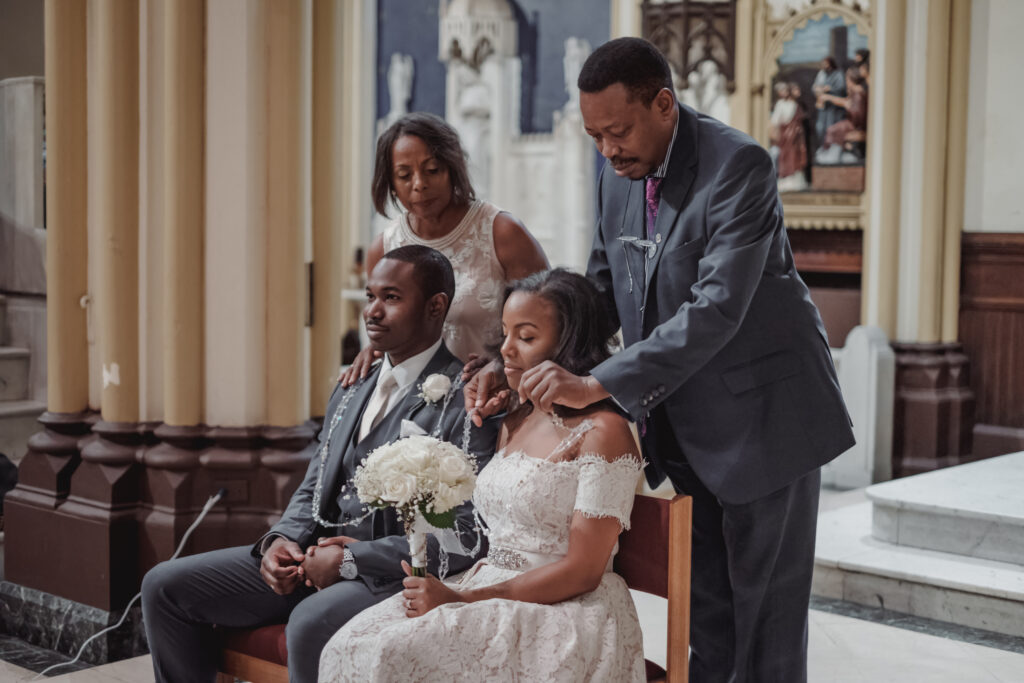
The vows provide the essential framework that disciplines spouses and fosters a mature love over a lifetime. The community of friends and family who believe in marriage offers positive examples of married life, peers and elders who share the joys and sorrows of married life, and single elders and peers who offer friendship and mutual support.
Not all marriages can be successful. Some people, for reasons stemming from childhood trauma, addiction, or irreconcilable hurt, must divorce for the sake of their sanity. But I’m convinced that most marriages can be saved and become successful if only spouses would make their marriage their primary commitment from the “get-go.” In doing so couples will take care of their relationship in the same way that they care for their garden or car or career; use whatever metaphor you like. Gardens need fertilizer, watering, and weeding; cars need gas, tune-ups, and repairs; and careers need internships, supervisors, and on-going training.
If you are married, it is important to determine how you are doing in married life. Take the quiz and find out! Indicate your level of agreement with each statement with 1=No, 5=Sometimes, and 10=Yes.
1. We approach our life together as a team.
No Sometimes Yes
1 2 3 4 5 6 7 8 9 10
2. We are aware of each other’s gifts and talents, and use them in the marriage.
No Sometimes Yes
1 2 3 4 5 6 7 8 9 10
3. Marriage has helped me to mature; it brings out the best in me.
No Sometimes Yes
1 2 3 4 5 6 7 8 9 10
4. We agree on our approach to money: saving some, meeting needs, and sharing.
No Sometimes Yes
1 2 3 4 5 6 7 8 9 10
5. We live a healthy balance of work, leisure, exercise, and sleep.
No Sometimes Yes
1 2 3 4 5 6 7 8 9 10
6. We take care of each other during illness and difficult times.
No Sometimes Yes
1 2 3 4 5 6 7 8 9 10
7. We agree on our approach to faith, family devotions, and service.
No Sometimes Yes
1 2 3 4 5 6 7 8 9 10
8. We are good friends and regularly make time for fun together.
No Sometimes Yes
1 2 3 4 5 6 7 8 9 10
9. We are very good at dealing with conflict.
No Sometimes Yes
1 2 3 4 5 6 7 8 9 10
10. I am very satisfied with our romantic, sensual life!
No Sometimes Yes
1 2 3 4 5 6 7 8 9 10
Tally individual numbers and place scores in the appropriate spaces below. Add the scores. The higher the score, the more successful the marriage. 70 + =Successful; 40-60 = needs work; 30 and under = HELP!
When I think about my marriage, I feel…____________ (select any of the feelings listed below that apply)
Positive emotions: Loved, happy, peaceful, connected, grateful, hopeful, other _______________
Difficult emotions: Uncertain, sad, hurt, restless, distant, regretful, despairing, other ___________
If you have a successful marriage or one that needs work, keep working on your marriage. Read books together, e.g. Gottman’s The Seven Principles for Making Marriage Work. You might even try the workbook Lori and I wrote, Hidden Treasure: Discovering the Amazing Gift of Your Marriage. (Both books can be ordered from your local book store.) I suggest you also attend a retreat for couples or a marriage enrichment weekend such as Marriage Encounter.
If you’re marriage needs HELP, don’t wait, contact a therapist trained in couple’s conflict right away. You will not regret turning a difficult marriage into one that fosters love and intimacy.
A Simple Lenten Devotion: Prayer before the Cross of Christ
This devotion is a family and/or community prayer often prayed at noon (or when it is convenient) on Fridays during ordinary time, every day during Lent and on any day when life is difficult.
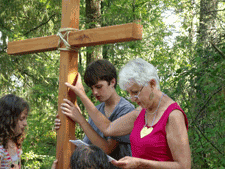
L For God so loved the world that he gave his only son, not to condemn the world but to save it. (John 3:16)
All Christ suffered for [us] that [we] should follow in his footsteps. (1 Peter 2:21)
L Though he was in the form of God, [Jesus] did not regard equality with God something to be grasped. Rather, he humbled himself …becoming obedient to death…death on a cross. (Philippians 2:6-8)
All Christ suffered for [us] that [we] should follow in his footsteps. (1 Peter 2:21)
L Jesus said, “Whoever wishes to come after me must deny himself, take up his cross and follow me. For whoever wishes to save his life will lose it, but whoever loses his life for my sake will find it.” (Matthew 16:24-26)
All Christ suffered for [us] that [we] should follow in his footsteps. (1 Peter 2:21)
L Let us pray.
All Father, I abandon myself into your hands; do with me what you will. Whatever you may do, I thank you: I am ready for all, I accept all. Let only your will be done in me, and in all your creatures – I wish no more than this, O Lord. Amen. (Prayer of Abandonment, Charles de Foucauld)
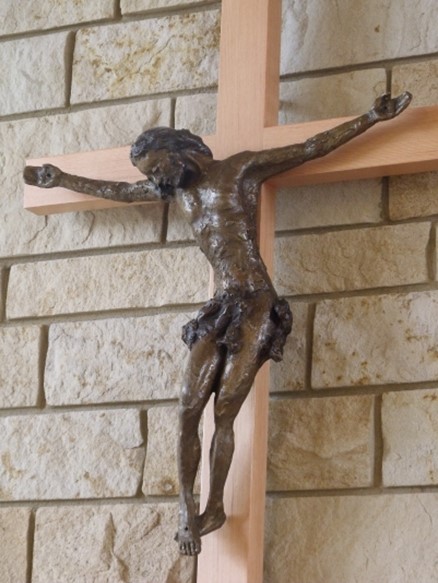
AGH! HELP! I HAVE A WOODEN BEAM STUCK IN MY EYE AND…
By Robert Fontana
Lent is here and “Spring is in the air.”
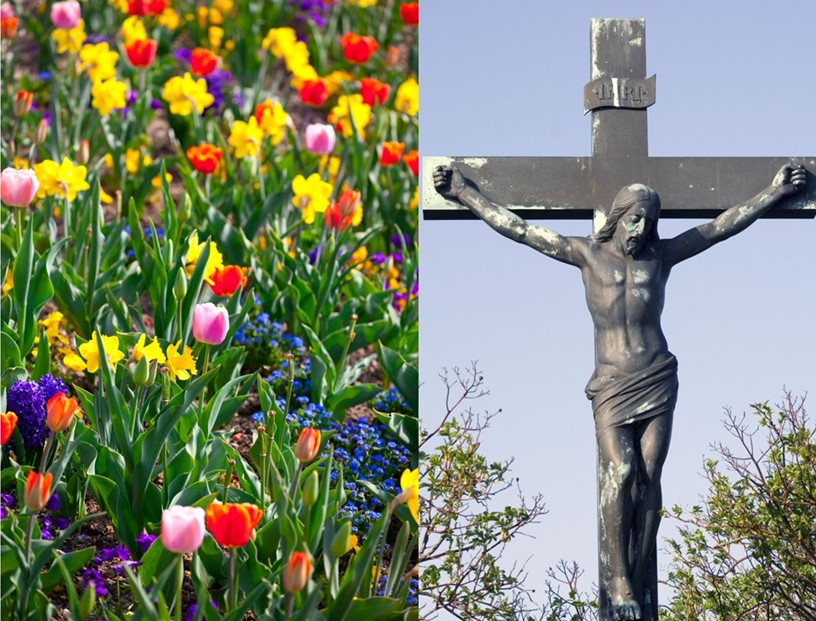
Ahhhh, what a great time of the year. Fasting from meat on Fridays and going to fish fries on Friday nights; attending Stations of the Cross on Mondays in March and rushing home just in time for watching the latest game in March Madness; and coping with the last days of darkness, rain, and winter with time for a walk through the cherry tree blossoms at University of Washington. Oh, of course, we pause from the solemnity of Lent on St. Patrick’s Day for some good Irish music, Irish beer, and Irish stew (or corned beef and cabbage if that’s your preference).
Lent is here alongside the rest of life’s happenings. Lent can easily become one of many Spring rituals that lead us to that wonderful Easter Day where we co-mingle the celebration of the resurrection of Jesus with the resurrection of the earth: Easter vigil and hunt for Easter eggs; baptisms of new members of the church and decorating the home with tulips and daffodils; Good Friday fasting and Easter Sunday feasting, with lots of chocolate.
What keeps Lent from simply becoming part of the cultural decorations of Winter as it becomes Spring? Lent has real meaning, of course, only when we use this season as a challenge to conform our lives to the life and teachings of Jesus and the Holy Spirit. This is complex. Jesus is both compassionate towards us in our weaknesses and demanding towards us as his disciples.
Jesus meets each of us exactly where we are in the spiritual life, and invites us to grow and mature, to gain a greater interior freedom to love God and neighbor. Certain aspects of Jesus’ teachings and actions will confront one person, while another person, reading the very same verse, may be unmoved.

That brings me to the Biblical text that confronts me this Lent:
Why do you notice the splinter in your brother’s eye, but do not perceive the wooden beam in your own eye? How can you say to your brother, ‘Let me remove that splinter from your eye,’ while the wooden beam is in your eye? You hypocrite, remove the wooden beam from your eye first; then you will see clearly to remove the splinter from your brother’s eye. (Matthew 7:3-5)
I don’t know about you, but the older I get, the bigger that beam seems to be! In fact, it’s not one beam, it’s several beams tied tightly together.
As I have learned over the years, an indication that I have a “beam” or many of them stuck in my eyes and need to do some self-reflection on why they are there and how to remove them, is how I instinctively react to a certain situation, news report, comment from a friend or stranger, etc. My gut reactions that are defensive, that insist on an immediate response, explanation or even retaliation, are clear evidence that the major problem here is in me and not the other person or event.
Learning to pay attention to myself and my reactions to life to identify how I want to change or mature has been a long and slow process. I was introduced to this method in self-awareness while training to be a chaplain at Fircrest, a school for the severely mentally handicapped in Seattle. I was assigned to work with residents who had the cognitive ability of a small child and could not verbalize their needs.
What was my reaction to working with these folks who seemed to be trapped in big bodies with little ability for self-care? FEAR! I did not know how to be me with them. I was worried about doing the wrong thing and afraid of dealing with their tantrums or other forms of acting out.
I brought these issues to my supervisor and small group, initially saying that I was probably in the wrong place. I did not belong here. “No,” said my wise teacher, “you are in the right place because these people are going to teach you to let go of your fears, let go of your ego that wants to accomplish something, and let go of your timeframe and slow down. You are not here as much to learn about working with this population of people but so these beautiful people can teach you to learn about yourself. Being here and learning about your fears and anxieties will teach you how to let go of these so that you can be with these people as they need you to be with them.”
That training lasted for four months in the Summer of 1990. I have been trying to practice the lessons my differently abled friends taught me ever since.
Lent challenges me, not so much to look at my sins and say, “Mea culpa,” although there is that aspect of Lent. It has me asking Jesus,
“What’s the beam in my eye that needs to be looked at and removed in this situation, in this relationship?”
At the end of each day, I try to do what the Jesuits describe as an examen of conscience. I review my day and try to name moments – encounters or situations – that evoked an emotional response. What happened? What were my emotions? Where did they come from? What biases, prejudices, sinful inclinations and/or painful memories do they tap into? What is the Spirit telling me through these moments? How am I being invited to mature, to grow?
Of course, the day may have also presented positive moments and emotions. I examine these in the same way.
It may be that I need to speak to someone about something he or she did that I found hurtful or that I didn’t understand. But before I do so, I want to reflect and call on God’s grace to take the “beam” out of my eye before I take the “speck” out of his/hers.
I DON’T LIKE JESUS
By Robert Fontana
Jesus lives in my neighborhood. I do not mean to shock you with this fact, but I don’t like him. When I see Neighbor Jesus coming towards me or find myself walking towards him, I want to avoid any interaction. Neighbor Jesus is nothing like the Bible Jesus I see depicted in movies, hear about in sermons and homilies, or even imagine in my own mind. Bible Jesus is awesome! He is a great storyteller, welcomes children, loves animals and nature, challenges hypocritical religious leaders, and comforts the sick and the sorrowful.
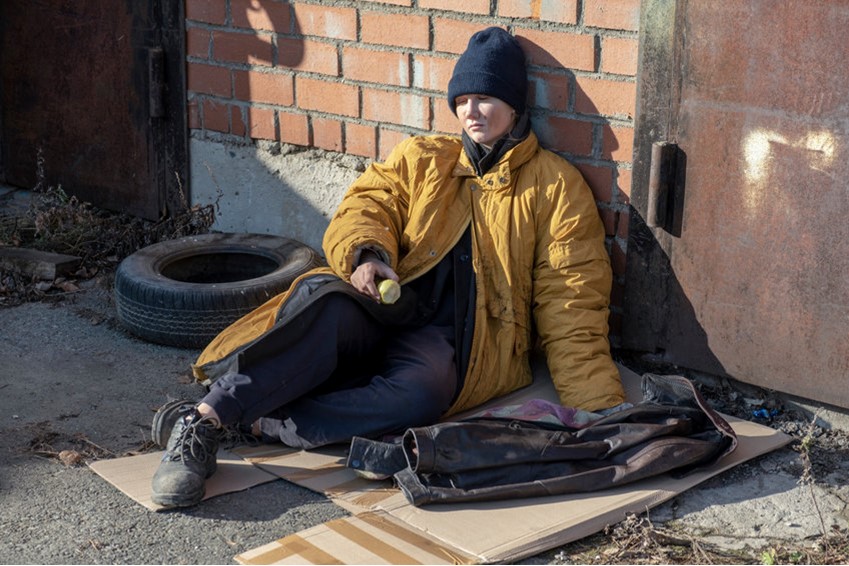
I like Bible Jesus. But Neighbor Jesus, that’s another story.
Neighbor Jesus lives in the green space near our home that is about one-half mile long and maybe 100 yards wide. The green space begins at Cowen Park which has a large open meadow and playground. The green space continues east forming a deep ravine with a flowing stream and lush trees and ferns on either side. It concludes at Ravenna Park with a ballfield and playground which give the green space its popular name, Ravenna Ravine.
At a random point anywhere between the two parks, Neighbor Jesus will find a spot to call home and settle in. Sometimes this means he brings in a tent along with a collection of items I assume are stolen from people’s yards and nearby stores. These items get strewn around his tent along with milk cartons, food wrappings, plastic bags, and other garbage. And, yes, when Neighbor Jesus leaves one spot to move to another, he leaves his former spot a mess for someone else to clean up.
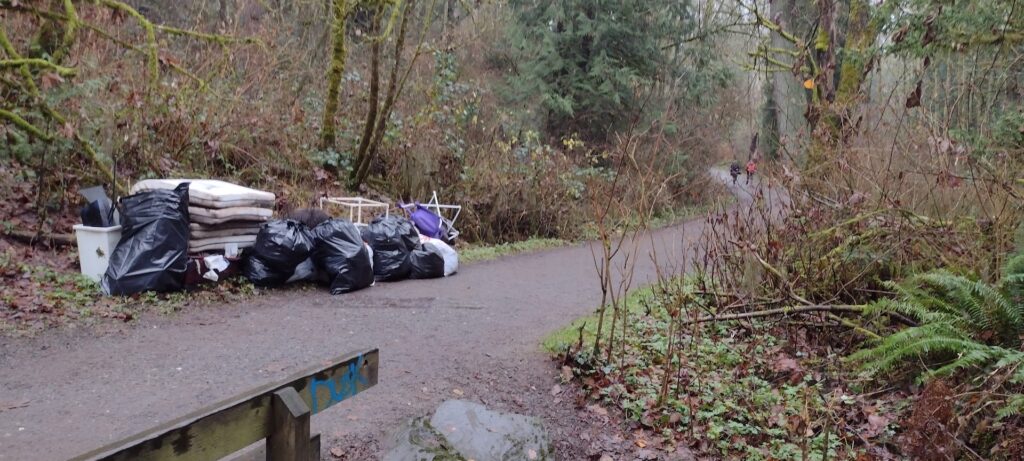
Neighbor Jesus is nice enough, though I have heard some angry outbursts from him on occasion. We do exchange pleasantries when we cross paths. Lori and I have “friendship bags” prepared for people whom we encounter who do not have homes. These bags contain soft food items, socks, sweet treats, and a handout with information about how to access nearby shelters. We’ve given Neighbor Jesus a number of these, plus I often bring him coffee and occasionally an egg sandwich. He is grateful for these kindnesses.
I confess I don’t like continuing to give him these friendship bags because I do not want him to stay in the area. I certainly do not want him to know where I live and have him come knock on my door asking for help. And I don’t want to be picking up all the “trash” from the Friendship Bag that I gave him only a few days ago.
I walk through the Ravenna Ravine 3-4 times a week for my prayer time. I walk through the beautiful and diverse trees to spend time with Bible Jesus whom I like…and I do not want to encounter Neighbor Jesus. I do not like finding him sprawled out under a tree or hanging out on a bench asking me for a “cuppa coffee.” He ruins my time with Bible Jesus! He’s such an inconvenience!
Just today we had such an encounter. I was polite enough as I spoke to Neighbor Jesus who was just waking up, huddled beneath a tarp, obviously freezing cold in the 19-degree weather overnight. Yes, he asked me for coffee, and I said, “No, sorry, I don’t have any.” Which was true; I wasn’t carrying any coffee with me. But what I was really saying was, “Don’t interrupt my time with Bible Jesus! I only have so much time, and I don’t want to use it up on you, Neighbor Jesus.”
Predictably, as I walked away and turned my attention to Bible Jesus, I felt uncomfortable. I could hear Bible Jesus reminding me of a key passage from Scripture, “When I was hungry…sick… imprisoned…naked…you comforted me.” And then I heard a voice in my head/heart say, “There is little difference between Bible Jesus and Neighbor Jesus. Neighbor Jesus is what Bible Jesus looks like crucified, crucified by who knows what. Childhood trauma? Severe addiction? Terrible decisions? All of the above? Perhaps he has a criminal record? Perhaps he has burned all his family relationships? What is yours to do now?”
I walked back to Neighbor Jesus whose birth name is Jay and asked if he still wanted that coffee. “Yeah,” he replied, sitting up. “And you got one of them bags with stuff for me?”

“Wait here,” I said. And I walked back home to get hot coffee, an egg sandwich, and yet another Friendship Bag for my Neighbor Jesus.
A Reflection on Women in the Church (guest writer)
Lorene Davidson was asked by our pastor to give a reflection on Women in the Church in place of his homily on the Feast Day of ST. Phoebe, deaconess and companion of St. Paul (Romans 16:1). She has given us permission to reprint it here.
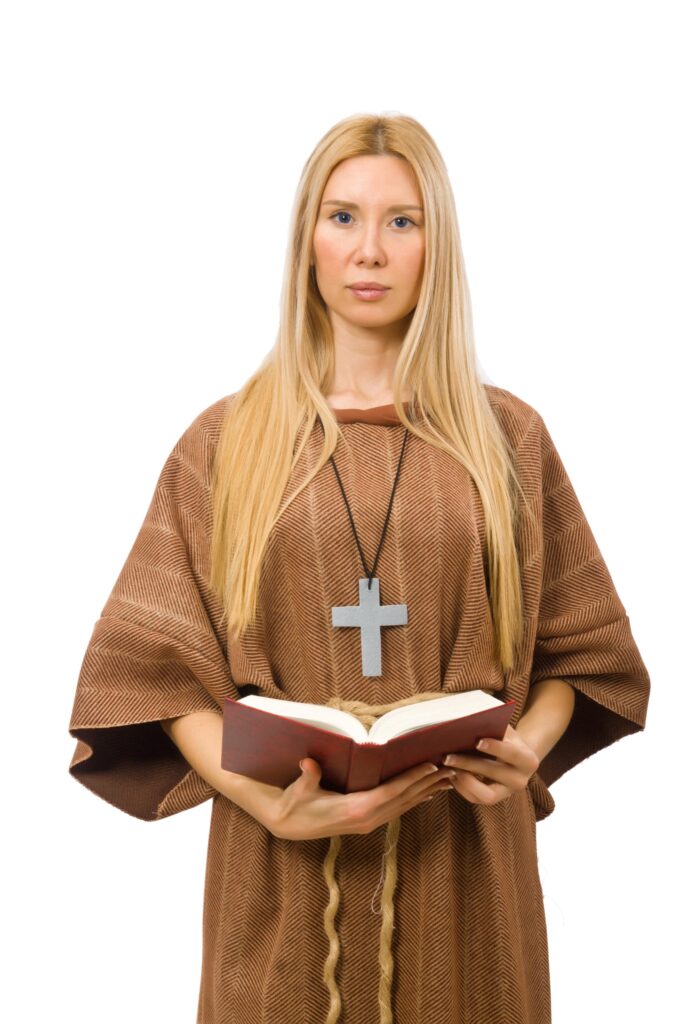
When Fr. Oliver asked me to offer this reflection, I had just heard Maria Laughlin from St. James Cathedral share her experience of the synod gatherings in our archdiocese. It filled me with hope for the future of our church. People of all ages and backgrounds came together to listen to each other intentionally and share from their hearts what they envision for the future of our church. She said that the Holy Spirit’s presence was evident.
When the results of the first phase of the global synod were published, I felt uplifted and energized. People from all around the world believe that there is an urgent and critical need to rethink women’s participation in the church. The number of priests is dwindling. We need more vocations to the priesthood, but we also need laypeople to step forward to help – both laywomen and laymen. Religious women and men are also a great resource.
There are nuns all over the world carrying out leadership roles, but they often lack official recognition or support. There are women in the Amazon acting as deacons with the blessings of their bishops. Because there are so few priests, some remote communities do not see a priest for six months to a year. These women are baptizing, officiating at marriages, and ministering to the spiritual and physical needs of the communities. And yet, these women cannot be ordained as deacons.
Where is St. Phoebe in all this? St. Phoebe was a deacon and benefactor of the church in Greece. She, along with other women and men, spread the gospel across Asian Minor and east to the Roman Empire. St. Paul himself commended her to the Christian community in Rome, asking them to receive her in the Lord and treat her in the manner of the holy ones. Paul said that she was a benefactor to many including himself. (Romans 16:1-2). Think of the courage it took for a woman to travel 700 miles to a country and community she did not know. Imagine that strength of her faith. She is a reminder that there is historical precedent for women deacons in the Catholic Church.
I have seen so many changes in our church during my lifetime. When I was a child, we did not have “Altar Servers,” we had “Altar Boys.” There were no lectors or Eucharistic ministers. The priest did it all. Of course, most parishes had two, three or more priests to divide the labor. Our priests need our support. And many of them would welcome it.
My mother is often on my mind when I am a server, lector, or Eucharistic minister. She and many of the women in her generation would have welcomed the opportunity to serve in the way women can now serve. I am so thankful that I can participate more fully in the life of our church. The last few years I have been serving at daily Mass with a team of eight other women and men. As a server I feel even more connected to the liturgy and the Eucharist. As a Eucharistic minister I feel a special bond to each communicant. I am in awe of offering them the body of Christ. As a lector, the connection to the word of God, studying it, reflecting on it offers new insights into God’s message.
And His message can change in different circumstances. For example, Mark 16:18 says, “they will pick up snakes with their hands, and if they drink poison, it will not harm them.” I could not relate to this until I went to healing ministry with two women from our parish. They gave me several Bible verses to meditate on while I was in treatment for cancer. It was like the Holy Spirit turned a light on in my head. These words were spoken 2000 years ago, before there was chemotherapy, and yet they are a perfect description. It brought me peace and calm. It gave me hope.
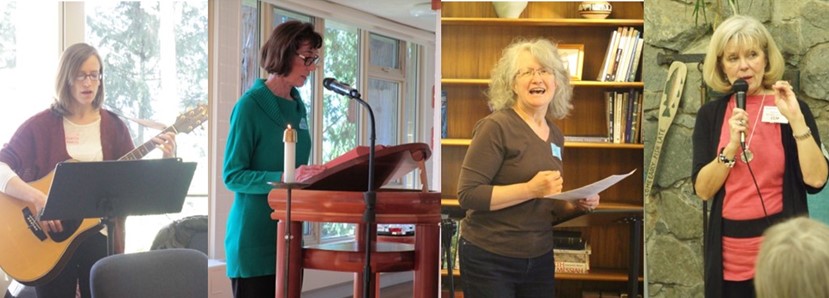
This healing ministry is just one example of the important work women in our church are doing. Look around you in our parish – at Mass and in the wider community, women are serving the needs of others. They are Eucharistic ministers, ushers, lectors, members of the RCIA team, teachers in religious education, members of St. Vincent de Paul, members of the parish council and countless other ministries. There is a saying, “Women hold up half the sky.” Women and men need to serve together, but as equals.
We all become disciples at our baptism. We all have different gifts, through God’s grace. God wants each of us to use our gifts to support each other and our community. As I look around our parish, I am amazed at all the time, treasure and talent that is given. This is exactly what is needed to strengthen our faith and our church. As we approach the start of the synodal assembly [in October], I am optimistic. The members of the synodal assembly will gather in Rome to discern what steps the Holy Spirit invites us, the Universal Church.
To grow as a synodal church, the pope has appointed 450 participants, including dozens of religious women and men and lay people from around the world, to attend the general assembly of the synod of bishops. The voting members number the pope plus 363 cardinals, bishops, priests, religious, and lay women and men. Out of the 364 members who can vote, 54 are women…either lay or religious. This seems very positive to me. Let us pray for the members’ thoughtful discernment and blessings on church renewal.
If you could ask Pope Francis any question…
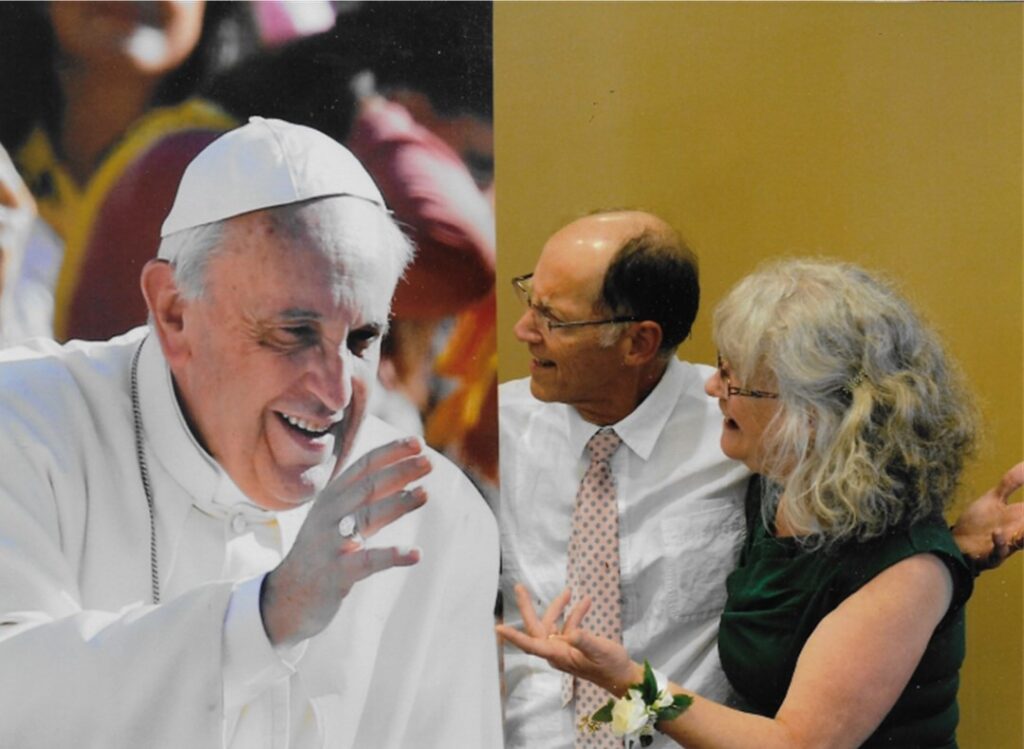
Dear Friends, as you know Lori and I wrote Pope Francis and asked for a meeting to discuss how critical it is that he publicly support people like us who have exposed cover-up of clergy sex abuse. That’s our concern. What’s yours? If you could ask Pope Francis any question or present him with a short statement of wisdom/insight/a problem, what would that be?
Let us know and we will leave these with Pope Francis should we meet with him or with a Vatican office if we do not. Keep your question or comment to 25 words or less and send it to us by September 21 (that’s when we leave). We will print all questions and comments on our blog site.
Send your question and/or comment to robert@catholiclifeministries.org.
________________________________________________________________________
CLM Fall Retreat— Day of Prayer and Study—Saturday, October 28th
“Celebrating 10 Years of Pope Francis”
Our presenter is new to our CLM community: John Skrodinsky, religious brother of the Missionary Servants of the Most Holy Trinity (ST).
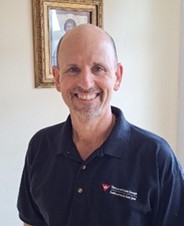
“…when I met the Missionary Servants of the Most Holy Trinity….I was impressed by the men, their down-to-earth nature, their love for God and for serving God’s people, especially the poor. By God’s grace, I was accepted into the Congregation.”
John made final vows in 2000. He has worked in campus ministry, as a drug and alcohol counselor, and in ministry to migrants. John currently directs the pre-novitiate formation house for the ST’s in Chicago. He has a Masters in Pastoral Studies and a law degree from Temple University.
Location: Assumption Parish, Seattle. Time: 9:30 am – 4:30 pm.
Topics: “From Jorge Bergoglio to Pope Francis” (Bro. John); “Pope Francis as Teacher: Encyclicals and Apostolic Exhortations (Bro. John); Pope Francis: Changing Catholic Culture Not Doctrine (Robert)
Cost: $30(single), $50(couple) Scholarships available. Please bring your own brown bag lunch. Snacks/drinks will be provided.
To register: Email: Robert@catholiclifeministries.org that you wish to participate, and pay the fee at the following link: https://www.paypal.com/donate?token=RgGj4GeyNRG2RG1PJGtU2QW-i8lUGYsZjQJEBStEjLlgMc2yU2SOXYHWaQ6F44_sGe85TxKkKlWFGVcB
OR bring a check to the retreat, payable to CLM.
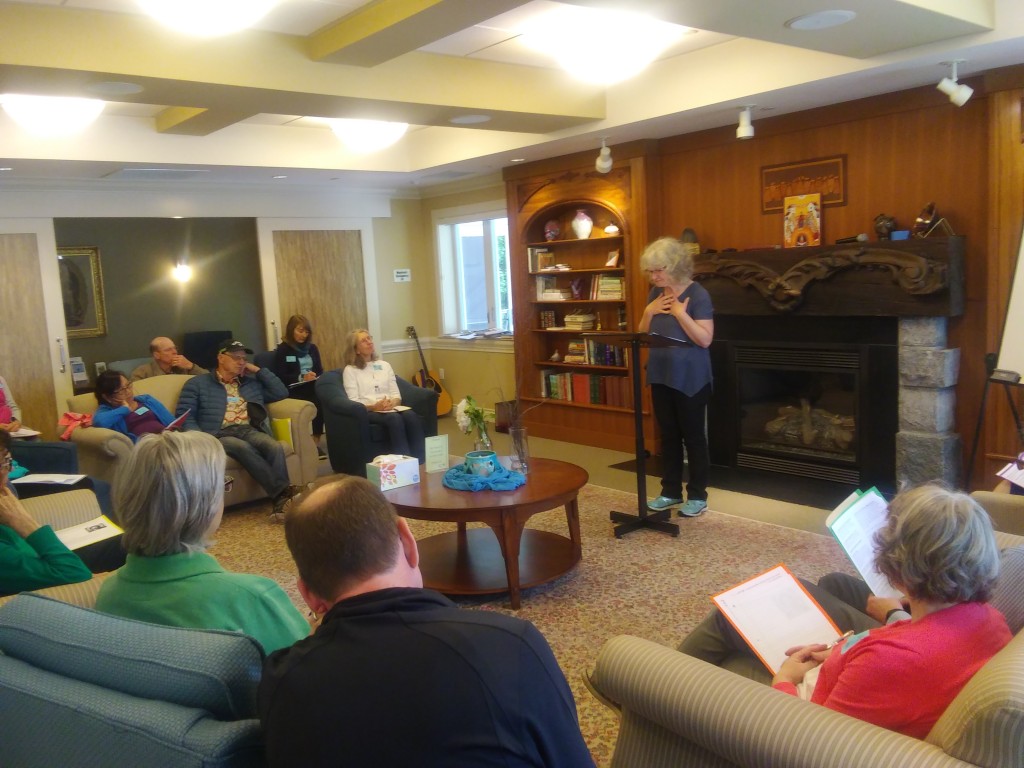
HOMESPUN HOMILY BY LORI: IT’S BEEN A VERY HARD WEEK
Two our of friends died this month – both “too young.” Both funerals were celebrated this past week.
On July 1, Angela, a counselor colleague of Robert’s, died while swimming, probably due to a cardiac event. Her death was quite shocking, really. We did not know she had any major health concerns. Only 44 years old, she was one of the most dynamic, vivacious, faith-filled people we know.

She was a force of nature, and from all accounts, a very caring, skilled mental health therapist. She was single; her extended family lives back east; so, with a couple other of her friends, Robert and I helped to clean out her counseling office and clear out her apartment. When her dad and sister arrived, we connected in a small way to grieve and to share some happy, poignant memories of Angela.
Angela’s memorial Mass was well attended. It was beautiful, formal, with lots of Latin chants and old hymns. Her sister gave a heart-warming, heartfelt, and humorous eulogy. All of us Seattle friends knew how much Angela loved and treasured her family. That came through clearly in the eulogy.
Angela lived life with gusto. She did most everything full bore. She was “all in” with life and shared that zest with others. One day at the office, Robert ran into Angela and couldn’t help exclaiming, “Angela! You look like a leprechaun!” Angela was decked out in Emerald Isle green: green dress, green stockings, green shoes, even green eye shadow with sparkles.
Angela laughed her full-throated laugh and responded, “Thank you!”
She had a knack of drawing people into her enthusiasm because she was so confident in her own worth, loved by God. She will be greatly missed.
On July 17, our dear dear Yakima friend of many years, John, died. John’s death was long-expected. He battled a rare cancer, adenoid carcinoma, for 16 years. In the past 15 months, we’d made 3 different trips to Yakima when his wife called us to say, “I think this is it. You’d better come now to say goodbye.” But each time, John rallied…until this time.
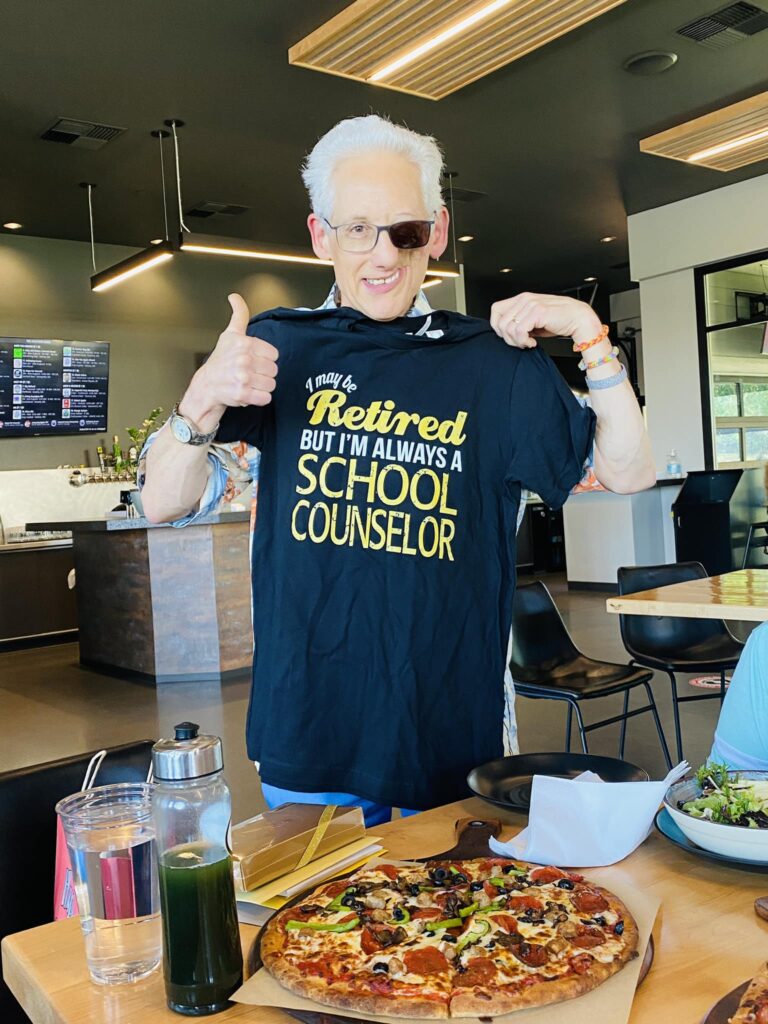
John gave us such a truly amazing example of “living until you die.” Just three weeks before he died, his family took him on a hot air balloon ride at sunrise. He was not able to speak much, but he was wide-eyed and alert and loving every moment, high in the sky, over sun-drenched Skykomish farmlands, surrounded by beloved family.
In his last months, he continued to jog, go to Friday evening Adoration, greet the mailman each day, play card games, especially Go Fish! He was a man of prayer, right to the end, filled with the hope and the assurance of God’s love and of life eternal with the angels, Mother Mary, and the communion of saints.
John’s funeral showed the depth and breadth of his love for others. There were people representing the different “spheres” of his life – his large family /extended family, school colleagues and students with whom he had worked as an elementary school counselor, friends – both current and also from grade school and high school. The stories and memories, along with laughter and tears, flowed copiously!
The loss of our two friends gives me much to ponder. I’m so sad. Waves of grief wash over me several times a day now. Tears flow, and I whisper prayers of thanksgiving for these dear ones and prayers of compassion for the family they leave behind.
But I’m also inspired. These two lovely people were people of great faith. They loved God and joyfully shared that love in all the circumstances of their lives. They met life challenges with the hope of eternal life. They remind us that we’re all on this same journey toward death, and onward to eternal life. And, very poignantly, they remind us to live fully until we die.
Bishop Desmond Tutu said:
“We are each made for goodness, love and compassion. Our lives are transformed as much as is the world when we live these truths.”
Our friends John and Angela lived this way. I want to follow their example, living until I die and using all my gifts, and even my imperfections, to be a power for God’s goodness in the world.
Homespun Homily: The 9th Sacrament and Having the Proper Tools
by Lori Fontana
You know how when you have a job to do, especially one that is a bit unfamiliar to you, the right tools make a HUGE difference in your success. In the past few weeks, Robert and I have had several occasions of attempting a job (home repair – not our strength!) and needing to find just the right tools to complete the job satisfactorily. More on this later…
Two Sundays ago, we heard a great homily about the 8th and 9th sacraments. Hey, you say! Doesn’t the church have only 7 sacraments? And if ever an 8th sacrament is talked about, wouldn’t that be “Bingo?”
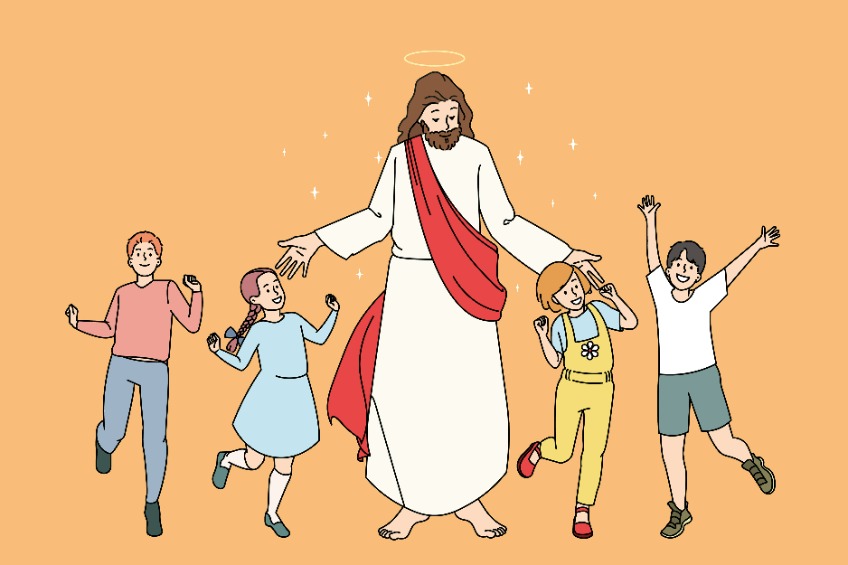
No, the priest did not talk about Bingo. But he did concur with many modern theologians who point to Jesus as the 8th sacrament – “an outward sign, instituted by Christ, to give grace.” The person of Jesus is the ultimate outward sign of God’s grace. Jesus shows us close up God’s love and mercy, God’s guidance and compassion. Indeed, Jesus is the very embodiment of grace in action, grace lived day-by-day in the world.
And what about a 9th sacrament?
Well, say many theologians, the 9th sacrament is “we,” we Catholics / Christians, all the people of God! After all, isn’t each one of us commissioned by our baptism to be living, breathing signs of God’s grace in the world? As St Teresa of Avila says,
“Christ has no body now on earth but yours, no hands, no feet but yours. Your are the eyes with which Christ looks out his compassion to the world. Yours are the feet with which he is to go about doing good. Your are the hands with which he is to bless us now.”
Author William J. Toms sums it up succinctly:
“Be careful how you live. You may be the only Bible some person ever reads.”
Pretty tall assignment – WE as sacrament. And my goodness, does our world need God’s grace! How can we live up to this task of being Jesus’ disciples?
Remember how I mentioned the importance having the “proper tools” for the job at hand? If we are the hands of feet of Jesus, if we are to make real the Gospel to those we meet, if we are a sacrament, then we must be equipped with the basic tools we need to share God’s grace. What are those necessary tools?
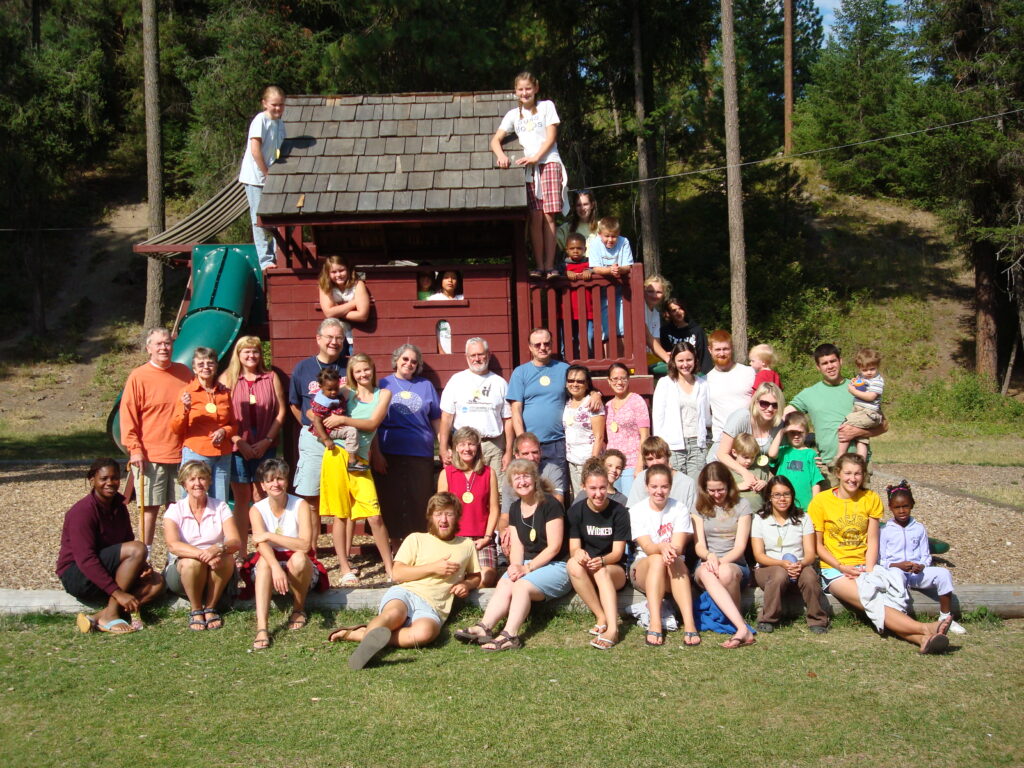
For a start, I propose these: openness, listening, and courage.
Openness – Can I be open to and in awe of our loving God; open to the promptings of the Holy Spirit; open to the dignity and marvel of God’s presence in each person I meet; open to the grandeur and wonder of nature, God’s creation?
Listening – Can I listen to the “still, small voice” of God in my prayer, learning from God’s directions and encouragement? Then can I bring that listening attitude to each person I meet?
Courage – Do I have the courage to believe that I am God’s ambassador in the world? Can I share my story, mainly by how I live my life, and when appropriate, through words?
Developing these tools of discipleship is a lifelong process. Our sphere of influence in bringing Christ to the world may seem very small. But each of us is important; in fact, each of us plays a vital role in bringing God’s message of love and forgiveness to the world. As Mother Teresa said, “Small things done with great love will change the world.” God wants to use us to spread grace and is just waiting for our “yes.” How will you be a sacrament today?